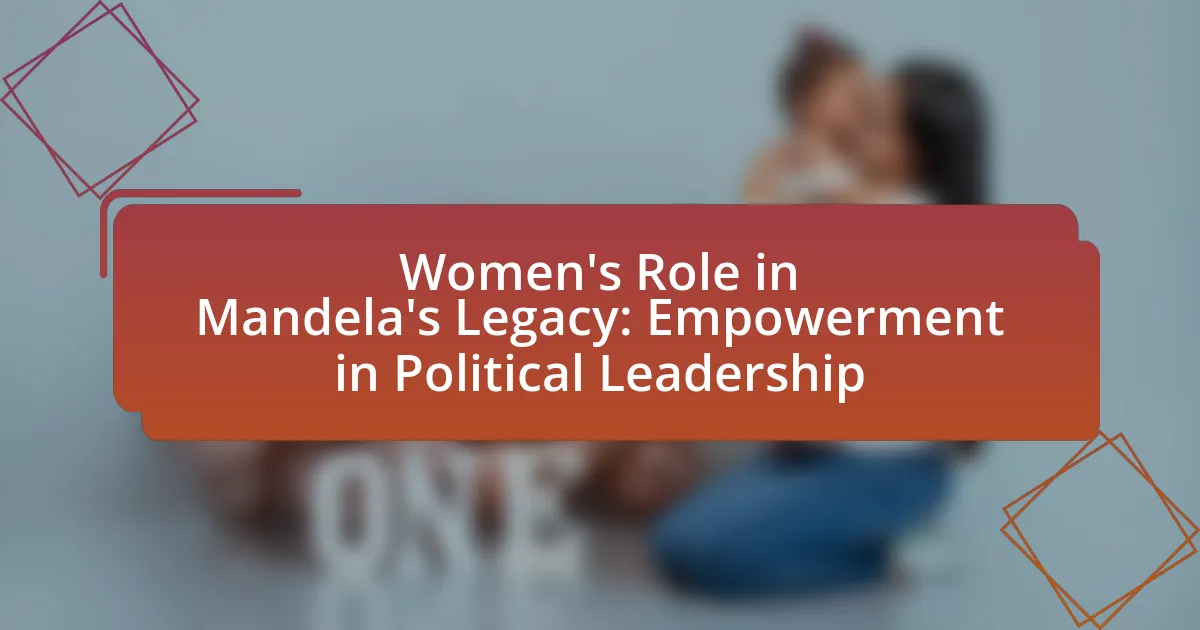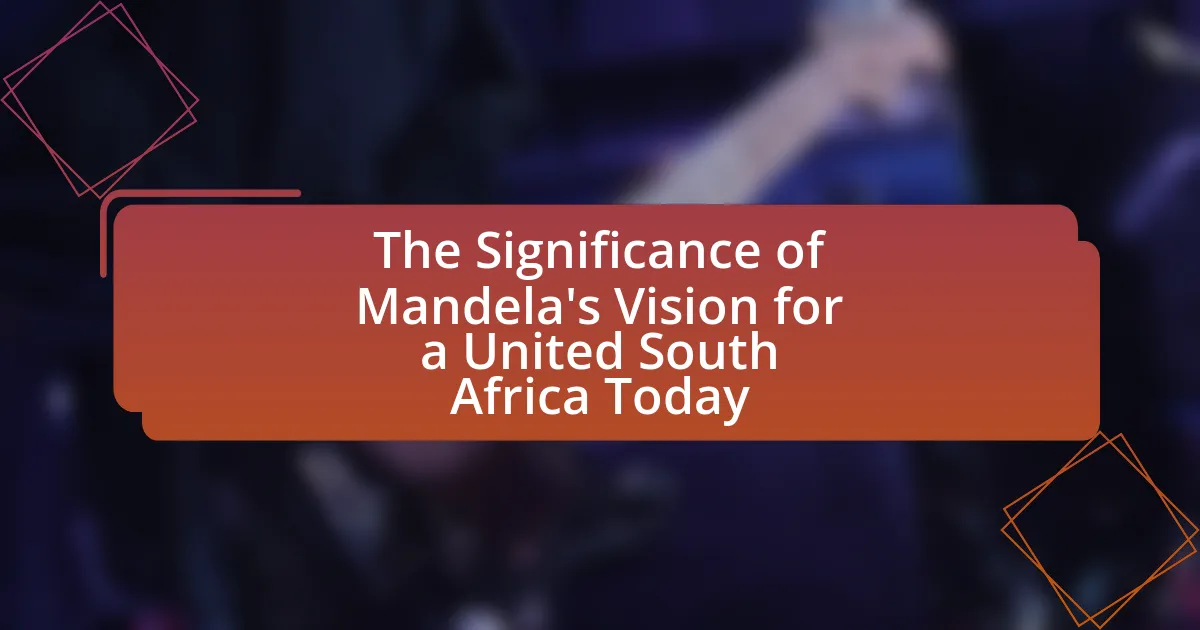Nelson Mandela’s leadership style, shaped by his experiences in the anti-apartheid movement and his 27 years of imprisonment, emphasizes reconciliation, inclusivity, and moral integrity. His approach to leadership, influenced by figures like Mahatma Gandhi, highlights the importance of dialogue and forgiveness in uniting diverse groups and fostering social justice. The article explores how Mandela’s early life, resilience during imprisonment, and commitment to empathy inform his leadership philosophy, providing valuable lessons for contemporary activists facing systemic challenges. It also examines the relevance of Mandela’s principles in today’s movements, the obstacles activists encounter, and practical steps for embodying his teachings in modern contexts.
How did Nelson Mandela’s leadership style emerge?
Nelson Mandela’s leadership style emerged through his experiences in the anti-apartheid movement, his imprisonment, and his commitment to reconciliation. His time in prison, spanning 27 years, shaped his views on negotiation and forgiveness, emphasizing the importance of dialogue over violence. Mandela’s leadership was characterized by inclusivity, as he sought to unite diverse groups in South Africa, fostering a sense of shared purpose. His ability to inspire and mobilize people was evident during the negotiations to end apartheid, where he advocated for peaceful transition and mutual respect. This approach not only facilitated the establishment of a democratic South Africa but also set a precedent for future leaders and activists, demonstrating the power of empathy and collaboration in leadership.
What were the key influences on Mandela’s leadership approach?
Nelson Mandela’s leadership approach was primarily influenced by his experiences with apartheid, his commitment to reconciliation, and the teachings of influential figures such as Mahatma Gandhi and Walter Sisulu. His time in prison exposed him to the harsh realities of oppression, shaping his resolve to advocate for equality and justice. Mandela’s emphasis on reconciliation over revenge was pivotal in uniting a divided nation, as seen in his efforts to foster dialogue between different racial groups. Additionally, the nonviolent resistance strategies of Gandhi and the mentorship of Sisulu instilled in him the importance of patience, negotiation, and moral integrity in leadership. These influences collectively informed Mandela’s ability to lead South Africa through a transformative period, promoting peace and democracy.
How did Mandela’s early life shape his leadership philosophy?
Nelson Mandela’s early life significantly shaped his leadership philosophy by instilling values of resilience, community, and justice. Growing up in the rural village of Mvezo, Mandela was influenced by the traditions of the Xhosa people, which emphasized communal responsibility and respect for elders. His education at the University of Fort Hare exposed him to political activism and the ideas of equality and human rights, further solidifying his commitment to social justice. Additionally, Mandela’s experiences with racial discrimination and his involvement in the African National Congress (ANC) during his youth fostered a deep understanding of the struggles against oppression. These formative experiences laid the groundwork for his later advocacy for reconciliation and equality, which became central tenets of his leadership philosophy.
What role did his time in prison play in developing his leadership style?
Nelson Mandela’s time in prison played a crucial role in shaping his leadership style by fostering resilience, empathy, and strategic thinking. During his 27 years of incarceration, Mandela developed a deep understanding of the importance of negotiation and reconciliation, which later became central to his approach in uniting a divided South Africa. His experiences in prison taught him the value of patience and the necessity of building alliances, even with former adversaries, as evidenced by his efforts to engage with the apartheid government during the transition to democracy. This transformative period not only solidified his commitment to non-violence but also enhanced his ability to inspire and mobilize others, making him a pivotal figure in the fight for equality and justice.
What are the defining characteristics of Mandela’s leadership style?
Nelson Mandela’s leadership style is characterized by inclusivity, resilience, and moral integrity. His approach emphasized reconciliation over retribution, as seen in his efforts to unite a divided South Africa post-apartheid, promoting dialogue and understanding among different racial groups. Mandela’s resilience was evident during his 27 years of imprisonment, where he maintained his commitment to justice and equality, inspiring others to continue the struggle for freedom. His moral integrity was reflected in his ability to forgive former adversaries, which fostered a culture of peace and cooperation. These characteristics not only defined his leadership but also serve as a guiding framework for contemporary activists seeking to effect social change.
How did Mandela demonstrate resilience in his leadership?
Nelson Mandela demonstrated resilience in his leadership by enduring 27 years of imprisonment while maintaining his commitment to the anti-apartheid struggle. His ability to remain steadfast in his beliefs, despite harsh conditions and personal sacrifices, exemplified his unwavering dedication to justice and equality. Mandela’s resilience was further evident when he emerged from prison advocating for reconciliation rather than revenge, which helped to unite a divided nation and foster a peaceful transition to democracy in South Africa. This approach not only showcased his strength of character but also set a powerful example for contemporary activists, illustrating the importance of perseverance and strategic thinking in the face of adversity.
What role did empathy play in Mandela’s approach to leadership?
Empathy was central to Nelson Mandela’s leadership approach, enabling him to connect deeply with diverse groups and foster reconciliation in post-apartheid South Africa. His ability to understand and share the feelings of others allowed him to bridge divides, as evidenced by his efforts to promote dialogue between conflicting parties, such as during the Truth and Reconciliation Commission. Mandela’s empathetic leadership style not only facilitated healing in a fractured society but also inspired contemporary activists to prioritize understanding and compassion in their own movements.
In what ways does Mandela’s leadership style resonate with today’s activists?
Mandela’s leadership style resonates with today’s activists through his emphasis on reconciliation, inclusivity, and moral integrity. His approach to leadership, particularly during the transition from apartheid to democracy in South Africa, showcased the power of dialogue and forgiveness over retaliation, which is a principle many contemporary activists adopt in their movements for social justice. For instance, Mandela’s establishment of the Truth and Reconciliation Commission exemplified his belief in addressing past injustices while fostering unity, a strategy that modern activists utilize to promote healing in divided societies. Furthermore, Mandela’s commitment to equality and human rights continues to inspire activists globally, as seen in movements advocating for racial justice and LGBTQ+ rights, where leaders echo his call for dignity and respect for all individuals.
How can modern activists learn from Mandela’s strategies?
Modern activists can learn from Mandela’s strategies by adopting his principles of reconciliation, patience, and grassroots mobilization. Mandela emphasized the importance of dialogue and understanding opposing viewpoints, which can help activists build coalitions and foster unity in diverse movements. His long-term vision and willingness to endure personal sacrifice for the greater good demonstrate the value of resilience and commitment in activism. Additionally, Mandela’s ability to inspire through personal storytelling and moral authority can guide activists in effectively communicating their messages and rallying support. These strategies are validated by Mandela’s successful transition from prisoner to president, where he united a divided nation through these very principles.
What specific tactics did Mandela use that are applicable today?
Nelson Mandela employed several specific tactics that remain applicable today, including negotiation, reconciliation, and grassroots mobilization. His negotiation skills were evident during the transition from apartheid, where he engaged with adversaries to reach a peaceful resolution, demonstrating the importance of dialogue in conflict resolution. Reconciliation was central to his leadership, as he promoted unity among divided groups, exemplified by the establishment of the Truth and Reconciliation Commission, which emphasized healing over retribution. Additionally, Mandela’s grassroots mobilization efforts, such as organizing mass protests and rallies, showcased the power of collective action in advocating for social change. These tactics underscore the relevance of negotiation, reconciliation, and grassroots activism in contemporary movements for justice and equality.
How does Mandela’s emphasis on reconciliation influence current movements?
Mandela’s emphasis on reconciliation significantly influences current movements by promoting dialogue and understanding over conflict. His approach, exemplified during South Africa’s transition from apartheid, encourages activists to prioritize unity and healing in their struggles for justice. For instance, the Truth and Reconciliation Commission established by Mandela aimed to address past injustices while fostering a collective national identity, a model that contemporary movements, such as Black Lives Matter and various social justice initiatives, adopt to navigate divisive issues. These movements often invoke Mandela’s legacy to advocate for peaceful resolutions and inclusive practices, demonstrating the lasting impact of his reconciliation-focused leadership on today’s activism.
Why is Mandela’s legacy important for contemporary activism?
Mandela’s legacy is important for contemporary activism because it exemplifies the power of resilience, forgiveness, and inclusive leadership in the fight for social justice. His ability to unite a divided nation after decades of apartheid demonstrates that effective activism can lead to transformative change. For instance, Mandela’s negotiation skills and commitment to reconciliation, as seen in the establishment of the Truth and Reconciliation Commission, provide a framework for modern activists addressing systemic injustices. This approach encourages dialogue over conflict, inspiring movements worldwide to adopt similar strategies in their quests for equality and human rights.
What lessons can be drawn from Mandela’s successes and failures?
Lessons drawn from Mandela’s successes and failures include the importance of resilience, the power of forgiveness, and the necessity of inclusive leadership. Mandela’s resilience is evident in his 27 years of imprisonment, which he transformed into a platform for advocating peace and reconciliation in South Africa. His success in uniting a divided nation demonstrates that forgiveness can lead to healing and progress, as seen in his efforts to establish the Truth and Reconciliation Commission. Additionally, Mandela’s inclusive leadership style, which emphasized collaboration across diverse groups, highlights the effectiveness of engaging various stakeholders in the pursuit of social justice. These lessons are crucial for today’s activists, who can apply them to foster unity and drive meaningful change in their communities.
How does Mandela’s vision of equality inspire today’s leaders?
Mandela’s vision of equality inspires today’s leaders by emphasizing the importance of inclusivity and social justice. His commitment to dismantling apartheid and advocating for equal rights demonstrates that effective leadership requires a focus on the marginalized and oppressed. This approach encourages contemporary leaders to prioritize equity in their policies and practices, fostering environments where diverse voices are heard and valued. For instance, Mandela’s establishment of the Truth and Reconciliation Commission illustrates how addressing historical injustices can lead to healing and unity, serving as a model for leaders facing societal divisions today.
What challenges do today’s activists face in applying Mandela’s principles?
Today’s activists face significant challenges in applying Mandela’s principles, primarily due to systemic inequality and political resistance. Activists often encounter entrenched power structures that resist change, making it difficult to implement Mandela’s ideals of equality and justice. For instance, in many regions, oppressive regimes actively suppress dissent, limiting the ability of activists to mobilize and advocate for human rights. Additionally, the rise of misinformation and social media polarization complicates the dissemination of Mandela’s messages of unity and reconciliation, as activists struggle to counteract divisive narratives. These challenges highlight the ongoing relevance of Mandela’s principles while underscoring the complexities of enacting them in contemporary contexts.
What obstacles hinder the implementation of Mandela’s leadership style today?
The obstacles hindering the implementation of Mandela’s leadership style today include political polarization, economic inequality, and a lack of commitment to reconciliation. Political polarization undermines collaborative efforts essential for Mandela’s inclusive approach, as seen in many countries where divisive politics prevail. Economic inequality creates barriers to equitable access to resources and opportunities, contradicting Mandela’s vision of social justice. Additionally, the diminishing focus on reconciliation in post-conflict societies limits the application of Mandela’s principles of forgiveness and unity, which were crucial in South Africa’s transition from apartheid. These factors collectively challenge the adoption of his leadership style in contemporary activism.
How do societal and political contexts affect the application of Mandela’s principles?
Societal and political contexts significantly influence the application of Mandela’s principles by shaping the environment in which these ideals are interpreted and enacted. For instance, in societies experiencing systemic inequality or political oppression, Mandela’s emphasis on reconciliation and social justice may be prioritized to address immediate injustices. Conversely, in politically stable environments, his principles of forgiveness and unity might be applied more towards fostering dialogue and collaboration among diverse groups. Historical evidence shows that during South Africa’s transition from apartheid, Mandela’s principles were crucial in promoting peace and preventing civil unrest, demonstrating how the political landscape directly impacted the effectiveness of his leadership approach.
What are the common misconceptions about Mandela’s leadership that activists should avoid?
Common misconceptions about Nelson Mandela’s leadership that activists should avoid include the belief that he was solely a conciliator and did not advocate for radical change. While Mandela emphasized reconciliation, he also recognized the necessity of armed struggle during apartheid, as evidenced by his involvement with the African National Congress and its military wing, Umkhonto we Sizwe. Another misconception is that Mandela’s leadership was purely charismatic; in reality, his strategic thinking and ability to build coalitions were crucial to his effectiveness, demonstrated by his negotiations that led to the end of apartheid. Additionally, some activists mistakenly view Mandela as a symbol of passive resistance, overlooking his active role in mobilizing support and challenging systemic injustices. These misconceptions can lead to oversimplified views of leadership that do not account for the complexities and challenges faced in social movements.
How can activists effectively adapt Mandela’s teachings to modern contexts?
Activists can effectively adapt Mandela’s teachings to modern contexts by emphasizing reconciliation, inclusivity, and grassroots mobilization. Mandela’s approach to leadership highlighted the importance of dialogue and understanding among diverse groups, which is crucial in today’s polarized environments. For instance, his commitment to peaceful negotiation during South Africa’s transition from apartheid serves as a model for contemporary activists addressing systemic injustices. Additionally, Mandela’s focus on empowering local communities can inspire activists to prioritize grassroots initiatives that foster community engagement and collective action, as seen in movements like Black Lives Matter, which leverage social media to mobilize support and raise awareness.
What practical steps can activists take to embody Mandela’s leadership style?
Activists can embody Mandela’s leadership style by prioritizing reconciliation, fostering inclusivity, and demonstrating resilience. Mandela emphasized the importance of dialogue and understanding among diverse groups, which activists can implement by creating platforms for open discussions that bridge divides. Additionally, Mandela’s commitment to inclusivity can be mirrored by ensuring that marginalized voices are represented in decision-making processes. Resilience, a hallmark of Mandela’s leadership, can be practiced by activists through perseverance in the face of adversity, learning from setbacks, and maintaining a long-term vision for social change. These steps reflect Mandela’s approach and can effectively guide activists in their efforts for justice and equality.
How can collaboration and community engagement reflect Mandela’s approach?
Collaboration and community engagement reflect Mandela’s approach by emphasizing collective action and inclusivity in the fight for social justice. Mandela believed in the power of unity, as demonstrated during the anti-apartheid movement, where he mobilized diverse groups to work together towards a common goal of equality. His establishment of the Truth and Reconciliation Commission in 1995 further exemplified this, as it encouraged dialogue and healing among communities, fostering a collaborative environment for rebuilding a fractured society. This approach has inspired contemporary activists to prioritize community involvement and cooperative strategies in their efforts for change, reinforcing the idea that lasting impact is achieved through shared responsibility and collective effort.
What are the best practices for activists inspired by Mandela’s leadership?
Activists inspired by Mandela’s leadership should prioritize nonviolent resistance, community engagement, and inclusive dialogue. Nonviolent resistance, exemplified by Mandela’s approach during the anti-apartheid movement, has proven effective in mobilizing support and fostering solidarity without escalating conflict. Community engagement is crucial, as Mandela emphasized the importance of grassroots involvement, ensuring that the voices of marginalized groups are heard and represented. Additionally, inclusive dialogue promotes understanding and collaboration among diverse stakeholders, reflecting Mandela’s belief in reconciliation and unity. These practices are supported by historical evidence of Mandela’s successful strategies, which led to the peaceful transition from apartheid to democracy in South Africa.




